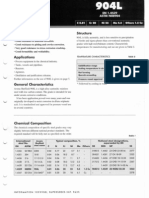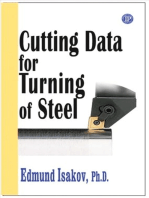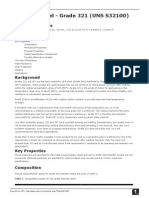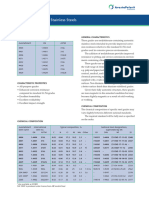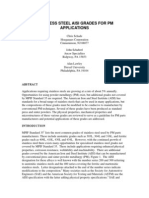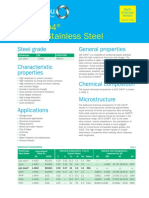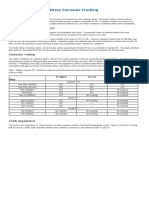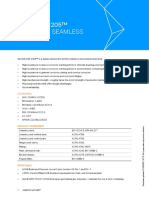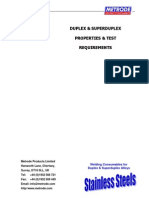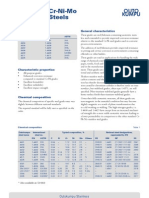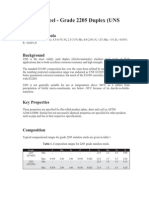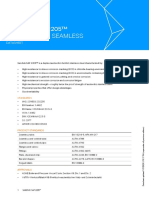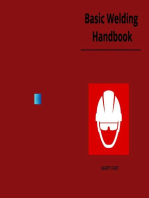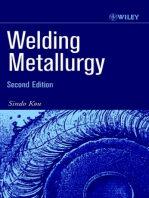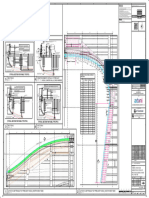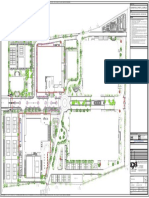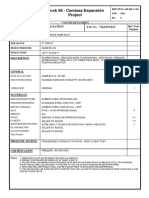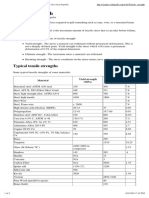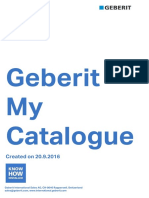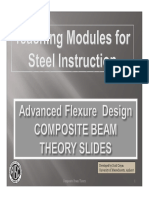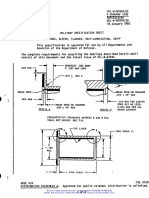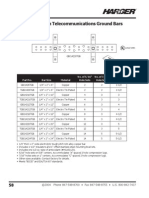Hardness Value 01
Hardness Value 01
Uploaded by
rajauae2008Copyright:
Available Formats
Hardness Value 01
Hardness Value 01
Uploaded by
rajauae2008Original Description:
Copyright
Available Formats
Share this document
Did you find this document useful?
Is this content inappropriate?
Copyright:
Available Formats
Hardness Value 01
Hardness Value 01
Uploaded by
rajauae2008Copyright:
Available Formats
NACE MR 0175/ISO 15156 for Corrosion Resistant Alloys for Sulphide Service Introduction NACE MR 0175/ISO 15156 is a Materials
Standard issued by the National Association of Corrosion Engineers. It is originally a US standard intended to assess the suitability of materials for oilfield equipment where sulphide (sulfide) stress corrosion cracking may be a risk in hydrogen sulphide (sour) environments. However, the world standards body ISO has issued it under its own "brand". The latest edition includes technical corrigenda from 2005. Discussions about the standard can be found on the NACE website. The standard specifies the types of corrosion resistant materials including stainless steels that can be used in specific oilfield environments and places limits on the hardness of the material. This applies both to parent and weld material. The maximum hardness is usually defined in terms of the Rockwell 'C' scale. No conversion to other hardness scales is given in MR 0175 which presents one problem as softened stainless steels hardnesses are measured using either the Rockwell 'B', Vickers or Brinell scales. Approximate conversions are available. Summary of MR 0175 Requirements A wide range of materials is covered by the standard including most types (families) of stainless steels. The table below shows some of these grades. However, this summary is intended to only give a general idea of this complex standard and is not a substitute for the original document. Steel Type Grades Included 405,430, 409, 434, 436, 442, 444, 445, 446, 447, 448 Comments Hardness up to 22 HRC
Ferritic
Martensitic 410, 420 Martensitic F6NM Martensitic S41425
Hardness up to 22 HRC Hardness up to 23 HRC Hardness up to 28 HRC
Austenitic
201, 202, 302, 304, 304L, Solution annealed, no cold work to enhance properties, 305, 309, 310, 316, 316L, hardness up to 22 HRC 317, 321, 347, S31254(254SMO), N08904(904L), N08926(1925hMo)
Austenitic
S20910 S31803 (1.4462), S32520 (UR 52N+), S32750 (2507), S32760 (Zeron 100), S32550(Ferralium 255)
Hardness up to 35 HRC PREN >30 solution annealed condition, ferrite content 35% to 65%, or 30 to 70% in welds. Note that the general restriction of 28 HRC in previous editions is not found in this latest edition of the standard. There is a specific restriction on HIP'd S31803 to 25HRC. For some applications cold worked material is allowed up to 36HRC 33 HRC Age hardening at 620 deg C
Duplex
Precipitation 17-4 PH Hardening Precipitation S45000 Hardening Precipitation S66286 Hardening
31 HRC Age hardening at 620 deg C
35 HRC
Free machining grades such as the 303 and 416 types are excluded from of NACE MR 0175/ISO 15156 Help on Materials Selection for Sour Gas Service The selection of the correct corrosion resistant alloy for a specific set of conditions is quite a complex subject. There are a number of consultancies which specialise in this work. Typical of these is Intetech who have developed Electronic Corrosion Engineer software which guides the user to the correct alloy.
You might also like
- 904LDocument5 pages904LManish542No ratings yet
- High-Reliability Lead-Free Solder Paste: Senju Metal Industry Co., Ltd. Senju Manufacturing (Europe) LTDDocument3 pagesHigh-Reliability Lead-Free Solder Paste: Senju Metal Industry Co., Ltd. Senju Manufacturing (Europe) LTDzaizamNo ratings yet
- Stress Corrosion CrackingDocument2 pagesStress Corrosion CrackingrenatobellarosaNo ratings yet
- NACE MR0175 Hardness RequirementDocument1 pageNACE MR0175 Hardness Requirementnhirpara1100% (2)
- Cladding & Nace 1Document21 pagesCladding & Nace 1armin heidariNo ratings yet
- Duplex Stainless Steels - A Simple Guide: How The Austenite/Ferrite Balance Is AchievedDocument4 pagesDuplex Stainless Steels - A Simple Guide: How The Austenite/Ferrite Balance Is AchievedAndy PhoenixNo ratings yet
- Duplex Stainless SteelsDocument7 pagesDuplex Stainless SteelsRizalzi BachtiarNo ratings yet
- Cartech Trimrite® Stainless: IdentificationDocument7 pagesCartech Trimrite® Stainless: IdentificationYassinSalahNo ratings yet
- Introduction NACEDocument7 pagesIntroduction NACEyohesh KaleNo ratings yet
- Choice of Specifications and Design Codes For Duplex Stainless SteelsDocument12 pagesChoice of Specifications and Design Codes For Duplex Stainless SteelsRonald Leyva GiraldoNo ratings yet
- Ur2202 Lean DuplexDocument8 pagesUr2202 Lean Duplexbuffle08No ratings yet
- Ruukki Hot Rolled Steels Processing of Material WeldingDocument11 pagesRuukki Hot Rolled Steels Processing of Material Weldingprince5621No ratings yet
- Duplex Stainless SteelsDocument24 pagesDuplex Stainless Steelsbhavesh nakumNo ratings yet
- North American Stainless: Long Products Stainless Steel Grade SheetDocument8 pagesNorth American Stainless: Long Products Stainless Steel Grade Sheettejap314No ratings yet
- VMA NACE Presentation Mar09 (Repaired)Document38 pagesVMA NACE Presentation Mar09 (Repaired)Lim100% (1)
- M C S E P A S S: Aterials For Ryogenic Ervice: Ngineering Roperties of Ustenitic Tainless TeelsDocument50 pagesM C S E P A S S: Aterials For Ryogenic Ervice: Ngineering Roperties of Ustenitic Tainless TeelswholenumberNo ratings yet
- Special Alloys and Overmatched Welding Products SolveDocument14 pagesSpecial Alloys and Overmatched Welding Products SolveBhanu Pratap ChoudhuryNo ratings yet
- Datasheet-Sandvik-254-Smo-En-V2021-04-22 18 - 35 Version 1Document10 pagesDatasheet-Sandvik-254-Smo-En-V2021-04-22 18 - 35 Version 1darioNo ratings yet
- Guidelines For Stainlesssteel WeldingDocument90 pagesGuidelines For Stainlesssteel Weldingquiron2010No ratings yet
- Duplex Stainless Steel AL 2205™ Alloy: (UNS S31803 and S32205)Document6 pagesDuplex Stainless Steel AL 2205™ Alloy: (UNS S31803 and S32205)Dell_RevanNo ratings yet
- Norsok M-001 - Materials Selection GuidanceDocument29 pagesNorsok M-001 - Materials Selection GuidanceWalid LabidiNo ratings yet
- Stainless Steel - Grade 321 (UNS S32100)Document4 pagesStainless Steel - Grade 321 (UNS S32100)mp87_ingNo ratings yet
- Technical Data Sheet: Stainless Steel: SuperausteniticDocument5 pagesTechnical Data Sheet: Stainless Steel: SuperausteniticSue EpicNo ratings yet
- Alloy 20 Data SheetDocument2 pagesAlloy 20 Data SheetSheikh ZakirNo ratings yet
- CR Ni MoDocument6 pagesCR Ni MoAli WeldingNo ratings yet
- Austenitic Standard GradesDocument6 pagesAustenitic Standard Gradesfierro44No ratings yet
- MaterialData - Aço 1045Document2 pagesMaterialData - Aço 1045Victhor AraujoNo ratings yet
- Stainless Steel AISI Grades For PM ApplicationsDocument16 pagesStainless Steel AISI Grades For PM ApplicationsAxtronNo ratings yet
- 1.4462 Duplex PropertiesDocument2 pages1.4462 Duplex PropertiesEROL30No ratings yet
- Duplex Stainless Steel LDX 2404 or 1.4662 PDFDocument4 pagesDuplex Stainless Steel LDX 2404 or 1.4662 PDFtienNo ratings yet
- 11-14%Cr IIW Document - Part 2 PDFDocument21 pages11-14%Cr IIW Document - Part 2 PDFManuel Carreño100% (1)
- Esab DublexDocument8 pagesEsab DublexSuphi YükselNo ratings yet
- Chloride Stress Corrosion CrackingDocument3 pagesChloride Stress Corrosion CrackingCharwin XiaoNo ratings yet
- Nippon Steel Data S001enDocument14 pagesNippon Steel Data S001enpower group100% (1)
- UNS S32760 Superduplex Stainless Steel For Wet FGD Air Pollution SystemsDocument15 pagesUNS S32760 Superduplex Stainless Steel For Wet FGD Air Pollution SystemsdsoNo ratings yet
- O - Alloy 59: Nicrofer 5923 HDocument12 pagesO - Alloy 59: Nicrofer 5923 HIniyan Thiruselvam Navaladi KarthikeyanNo ratings yet
- Calculation of Pitting Resistance Equivalent NumbersDocument7 pagesCalculation of Pitting Resistance Equivalent NumbersVivi OktaviantiNo ratings yet
- Specification Sheet: 2205: (UNS S32205/S31803)Document2 pagesSpecification Sheet: 2205: (UNS S32205/S31803)Haytham MohamedNo ratings yet
- AISI Alloy 4130 Steel Supply Range& 4140Document6 pagesAISI Alloy 4130 Steel Supply Range& 4140ap taNo ratings yet
- 2205Document2 pages2205JEPPIAR RNo ratings yet
- Outokumpu Duplex DatasheetDocument12 pagesOutokumpu Duplex DatasheetzosternatNo ratings yet
- Cartas de IsocorrosiónDocument4 pagesCartas de IsocorrosiónOliiroy Cruz TormenNo ratings yet
- Stainless Steel Grade Composition ChartDocument8 pagesStainless Steel Grade Composition ChartZaveri SagarNo ratings yet
- Alloy 20 Data SheetDocument2 pagesAlloy 20 Data Sheetqaisarabbas9002No ratings yet
- Datasheet-Sandvik-Saf-2205-En-V2020-12-10 07 - 47 Version 1Document15 pagesDatasheet-Sandvik-Saf-2205-En-V2020-12-10 07 - 47 Version 1Weipeng LvNo ratings yet
- Specification Data Sheet AISI 304Document8 pagesSpecification Data Sheet AISI 304Luis Enrique Carreon TorresNo ratings yet
- Chloride Stress Corrosion Cracking - SSINADocument4 pagesChloride Stress Corrosion Cracking - SSINADaniel WilliamsNo ratings yet
- Metrode Welding Duplex & Superduplex Stainless SteelsDocument18 pagesMetrode Welding Duplex & Superduplex Stainless SteelsClaudia Mms50% (2)
- Datasheet Sandvik Saf 2205 enDocument15 pagesDatasheet Sandvik Saf 2205 enoctavioNo ratings yet
- Datasheet-Saf-2205-En-V2021-09-23 08 - 17 Version 1Document15 pagesDatasheet-Saf-2205-En-V2021-09-23 08 - 17 Version 1Ade Indra WijayaNo ratings yet
- Standard Cr-Ni-Mo Stainless Steels DatasheetDocument6 pagesStandard Cr-Ni-Mo Stainless Steels DatasheetkitofanecoNo ratings yet
- SS2205 Material SpecificationDocument4 pagesSS2205 Material SpecificationCh FaiNo ratings yet
- Datasheet-Sandvik-Saf-2205-En-V2020-01-17 14 - 15 Version 1 PDFDocument15 pagesDatasheet-Sandvik-Saf-2205-En-V2020-01-17 14 - 15 Version 1 PDFDaniel GomezNo ratings yet
- Advanced Materials for Emerging Applications Innovations, Improvements, Inclusion and ImpactFrom EverandAdvanced Materials for Emerging Applications Innovations, Improvements, Inclusion and ImpactNo ratings yet
- Oxy-Acetylene Welding and Cutting: Electric, Forge and Thermit Welding together with related methods and materials used in metal working and the oxygen process for removal of carbonFrom EverandOxy-Acetylene Welding and Cutting: Electric, Forge and Thermit Welding together with related methods and materials used in metal working and the oxygen process for removal of carbonNo ratings yet
- Metallurgy and Corrosion Control in Oil and Gas ProductionFrom EverandMetallurgy and Corrosion Control in Oil and Gas ProductionNo ratings yet
- NMIAL-LNT-PT-PT1-DS-P1-GF-ST-59008Document1 pageNMIAL-LNT-PT-PT1-DS-P1-GF-ST-59008Manish coolNo ratings yet
- 1 Basic Concept in Prestressed ConcreteDocument27 pages1 Basic Concept in Prestressed ConcreteJaimeTurarayDayagJr.No ratings yet
- EXIM BankDocument79 pagesEXIM BankMishkaCDedhia0% (2)
- NSC LWD TP 105 - Tree Plan GFC R1-ModelDocument1 pageNSC LWD TP 105 - Tree Plan GFC R1-ModelSachin GandhiNo ratings yet
- The Indian Boiler RegulationsDocument63 pagesThe Indian Boiler RegulationsDurga Prasad100% (1)
- Top Civil Engineering Interview QuestionsDocument4 pagesTop Civil Engineering Interview QuestionsKeshava PrajwalNo ratings yet
- 18 - PPAG-100-HD-C-001 - s018 (VBA03C013) - 0 PDFDocument1 page18 - PPAG-100-HD-C-001 - s018 (VBA03C013) - 0 PDFSantiago GarciaNo ratings yet
- 3-Torsional Irregularity in Multi-Story StructuresDocument12 pages3-Torsional Irregularity in Multi-Story Structuresengomar nadyNo ratings yet
- 2010-2011 Louisiana Transportation Research Center (LTRC) Annual ReportDocument32 pages2010-2011 Louisiana Transportation Research Center (LTRC) Annual ReportwalaywanNo ratings yet
- Shea Menzel: Architecture PortfolioDocument10 pagesShea Menzel: Architecture PortfolioShea MenzelNo ratings yet
- En 19Document3 pagesEn 19Sanjay GoreNo ratings yet
- Fs Cantilever DesignDocument242 pagesFs Cantilever DesignRaju ShresthaNo ratings yet
- Tensile Strength - Simple English Wikipedia, The Free EncyclopediaDocument3 pagesTensile Strength - Simple English Wikipedia, The Free EncyclopediaAr Rupam KhungerNo ratings yet
- Cooling SystemDocument12 pagesCooling SystemSakoraphob BanlengchitNo ratings yet
- Masters of ArchitectureDocument17 pagesMasters of ArchitectureAr Marydin MendozaNo ratings yet
- Geberit My Catalogue: Created On 20.9.2016Document3 pagesGeberit My Catalogue: Created On 20.9.2016nadolumarianNo ratings yet
- 1 Composite Beam Theory: Developed by Scott Civjan University of Massachusetts, AmherstDocument27 pages1 Composite Beam Theory: Developed by Scott Civjan University of Massachusetts, AmherstRodolfo Jr MendozaNo ratings yet
- Critical Section For One Way ShearDocument1 pageCritical Section For One Way ShearQaiser KhanNo ratings yet
- F17110026-27 00 3 4Document1 pageF17110026-27 00 3 4iyytgfNo ratings yet
- A Basic But Helpful Guide On Framo SystemDocument29 pagesA Basic But Helpful Guide On Framo SystemKunal Singh100% (2)
- 1447734892-Design and Development of Manually Operated Multipurpose Bi-Piston Hydraulic PressDocument9 pages1447734892-Design and Development of Manually Operated Multipurpose Bi-Piston Hydraulic PressIrawan MalikNo ratings yet
- Indian Institute of Technology, Bombay: Geotechnical Investigation ReportDocument34 pagesIndian Institute of Technology, Bombay: Geotechnical Investigation Reportmanna.dass76No ratings yet
- Contraflame: Offshore Lightweight Passive Fire Protection and Insulation SystemsDocument24 pagesContraflame: Offshore Lightweight Passive Fire Protection and Insulation Systemshendry_hdwNo ratings yet
- DLSU Department of Civil EngineeringDocument32 pagesDLSU Department of Civil EngineeringAnge'le Mae CISNERONo ratings yet
- A G Chehab PHD Thesis (Civil Engineering) PDFDocument265 pagesA G Chehab PHD Thesis (Civil Engineering) PDFURINo ratings yet
- Lesson 1 and 2 Cons MethDocument30 pagesLesson 1 and 2 Cons MethJay LoyaoNo ratings yet
- Product Overview Sludge Pump Systems - 10310808 - ENDocument21 pagesProduct Overview Sludge Pump Systems - 10310808 - ENMohamed SalehNo ratings yet
- MIL-B-81934 2C Bearings, Self LubricatingDocument5 pagesMIL-B-81934 2C Bearings, Self LubricatingthomasNo ratings yet
- Me414 Lecture 1 Analysis of Simple StressesDocument19 pagesMe414 Lecture 1 Analysis of Simple StressesILEENVIRUSNo ratings yet
- BICSI Pattern Telecommunications Ground Bars: Section 1.3.9Document4 pagesBICSI Pattern Telecommunications Ground Bars: Section 1.3.9Chanchoneg NegroNo ratings yet
